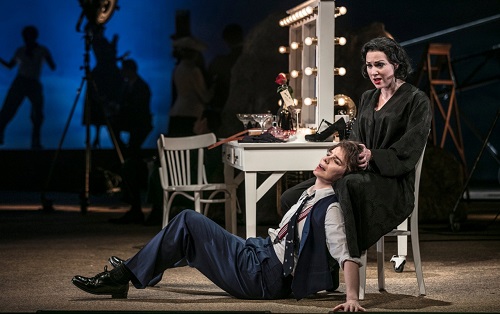 Sweden Richard Strauss, Ariadne auf Naxos: Soloists of Gothenburg Opera, Gothenburg Opera Orchestra/Patrik Ringborg (conductor), Gothenburg Opera main stage, 11.02.2018 (NS)
Sweden Richard Strauss, Ariadne auf Naxos: Soloists of Gothenburg Opera, Gothenburg Opera Orchestra/Patrik Ringborg (conductor), Gothenburg Opera main stage, 11.02.2018 (NS)
Cast:
The Major-Domo – Lars Hjertner
The Music Master – Mats Persson
The Composer – Ann-Kristin Jones
The Tenor/Bacchus – Daniel Frank
An officer – Alexander Grove
The Dancing Master/Scaramuccio – Conny Thimander
A wigmaker – Richard Laby
A lackey – Herbjörn Thordarson
Zerbinetta – Sofie Asplund
The Prima Donna/Ariadne – Annalena Persson
Naiad – Mia Karlsson
Dryad – Matilda Paulsson
Echo – Anna Johansson
Harlequin – Daniel Hällström
Truffaldino – Johan Schinkler
Brighella – Vassilis Kavayas
Extras and sponsors
Production: Co-production with Opera North. Sung in German with Swedish and English surtitles.
Director – Rodula Gaitanou
Set and costume design – George Souglides
Lighting design – Simon Corder
Choreography – Victoria Newlyn

If I could only use one word to describe this new production the word would be “inspired”. Director Rodula Gaitanou was an inspired choice for the Gothenburg Opera and together with a superb team she created one of the most memorable and beautiful opera productions I have ever seen.
Ms Gaitanou sets the story in a Felliniesque Italian film studio of the 1950s, where two films – one of the story of Ariadne on Naxos, the other a light musical comedy – that were to be made in parallel suddenly become one film due to cuts. The curtain opens on to a carefully laid out set, mesmerizingly lit by Simon Corder’s lighting (which was superb throughout). In a garret above the stage the Composer is putting the finishing touches to his first opera while underneath the studio hands bustle and sponsors are mingling in preparation for a dinner with the Producer. The entry of the opera singers and the commedia dell’arte artistes was mixed with delightful humorous touches, some slapstick but also a neat Callas reference (the Prima Donna arrives arm-in-arm with an Aristotle Onassis lookalike).
The stage business never overshadows the actions of the main characters, partly because of lighting that darkens the back of the stage. And the set for the second act is just as beautiful though more minimalist, focusing on a rock on top of which Ariadne pines away. In fact, being raised above the stage seems to be a metaphor in this production for being otherworldly: the Composer, Ariadne and Bacchus all enter high above the stage. Patrik Ringborg’s conducting was also perfectly judged; the music flowed beautifully and the dynamics were always sensitive to the singers.
The supporting cast performed well, especially the Music Teacher (Mats Persson) who convincingly acted out both his stabilising influence on the volatile Composer but also his own flashes of temper. Daniel Hällström was a particularly fine Harlequin with an attractive warm baritone but all of Zerbinetta’s players carried off the slapstick with brio in both acts. The three nymphs were simply superb, combining expressive singing with intricate choreography.
Ann-Kristin Jones was a perfect choice for the Composer. Her warm, overtone-rich voice poured out the seething emotions of a young man still finding his way in the world. The heavenly music in which the Composer expresses is almost religious reverence for Music was entirely believable and not the least ridiculous. Ms Jones also tenderly acted the Composer’s learning curve about love: from idealising the mythical Ariadne (“the woman who never forgets”, faithful to death even to the most faithless lover) he discovers a more earthly but no less beautiful love with Zerbinetta. In this production the Composer is wordlessly acting (watching the filming of the opera) in the second act, and the wordless meeting of the Composer and Zerbinetta at the end of the opera was beautiful to watch.

Annalena Persson acted an amusing Prima Donna. In the second act she convincingly expressed the dignified pain of Ariadne, but excelled in her meeting with Bacchus and her gradual change from resignation to wonderment and ecstasy. Daniel Frank was magnificent as Bacchus, bringing lyricism to this challenging role. (Perhaps not a surprise to those who heard him as Florestan but nevertheless beautiful to hear.) In particular he showed a touch of vulnerability which humanised Bacchus – who is after all in a way a callow young man just like the Composer.
Sofie Asplund was an unforgettable Zerbinetta. Her stage presence was fizzing with outward mischief but she convincingly showed her true (and more complex) feelings in her tender meeting with the Composer. The two classic male fantasy women – pure and faithful Ariadne versus coquettish, sexually available, no-strings-attached Zerbinetta – are shown to be just that – fantasies. Ms Asplund’s heavenly coloratura simply soared without strain, with the shimmering sweetness of a lyrical soprano right to the top. Zerbinetta’s famous aria was genuinely moving, not just a technical showpiece; indeed, in this production it was secretly addressed to the Composer as well as to Ariadne. It was a meditation on the tragedy of love – that those who most easily fall in love also are the ones who most easily hurt their lovers for precisely that reason – but also on it’s beauty and inevitability.
Come to Gothenburg and hear this wonderful Zerbinetta! But if you miss Ms Asplund this time, I can confidently predict that she will shortly be coming to a major opera house near you.
Niklas Smith
On 1 and 4 March the Composer is sung by Matilda Paulsson.